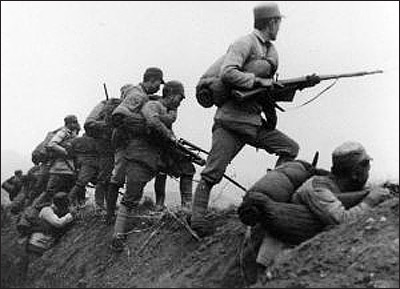The May 4th Movement of 1919 is regarded as the ideological
origin of many important events in modern Chinese history. Its
direct cause was the unequal treaties imposed on China after the
First World War. Motivated by strong patriotism, students initiated
the movement, and it further developed into a national protest
movement involving people from all walks of life. It also marked
the introduction into China of various new ideologies, among which
the spread of Marxism-Leninism is worthy of special mention. Under
the influence of Russia's October Revolution of 1917, 12 delegates,
including Mao Zedong, representing communist groups in different
places throughout the nation, held the First National Congress in
Shanghai in 1921 to found the Communist Party of China (CPC).
 |
The Chinese people led by the CPC underwent successively the
Northern Expeditionary War (1924-27), the War of Agrarian
Revolution (also known as "Ten-Year Civil War," 1927-37), the War
of Resistance Against Japan (1937-45), and the War of Liberation
(1946-49). Owing to the cooperation and joint resistance of the CPC
and Kuomintang, the Japanese aggressors were defeated but shortly
after the anti-Japanese war, the Kuomintang re-launched civil war.
After the three-year War of Liberation led by the CPC, the
Kuomintang government was finally overthrown in 1949.